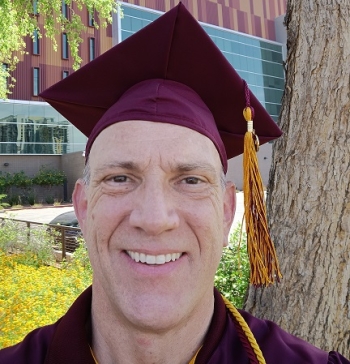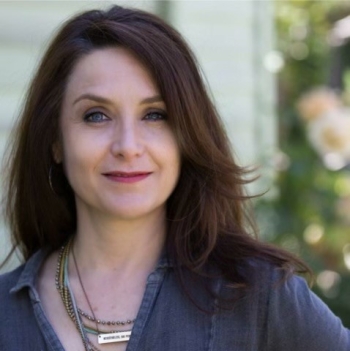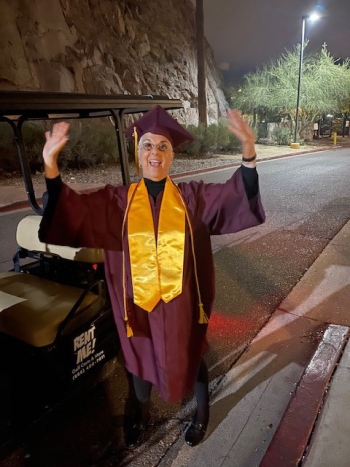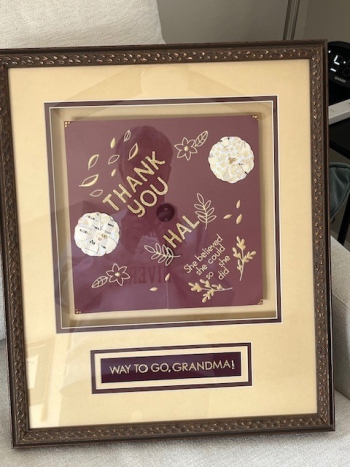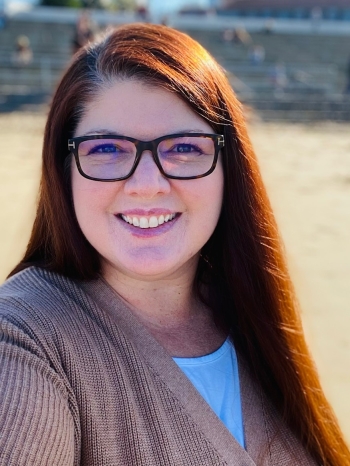'It's never too late': Older students fulfill goals with ASU Online degrees
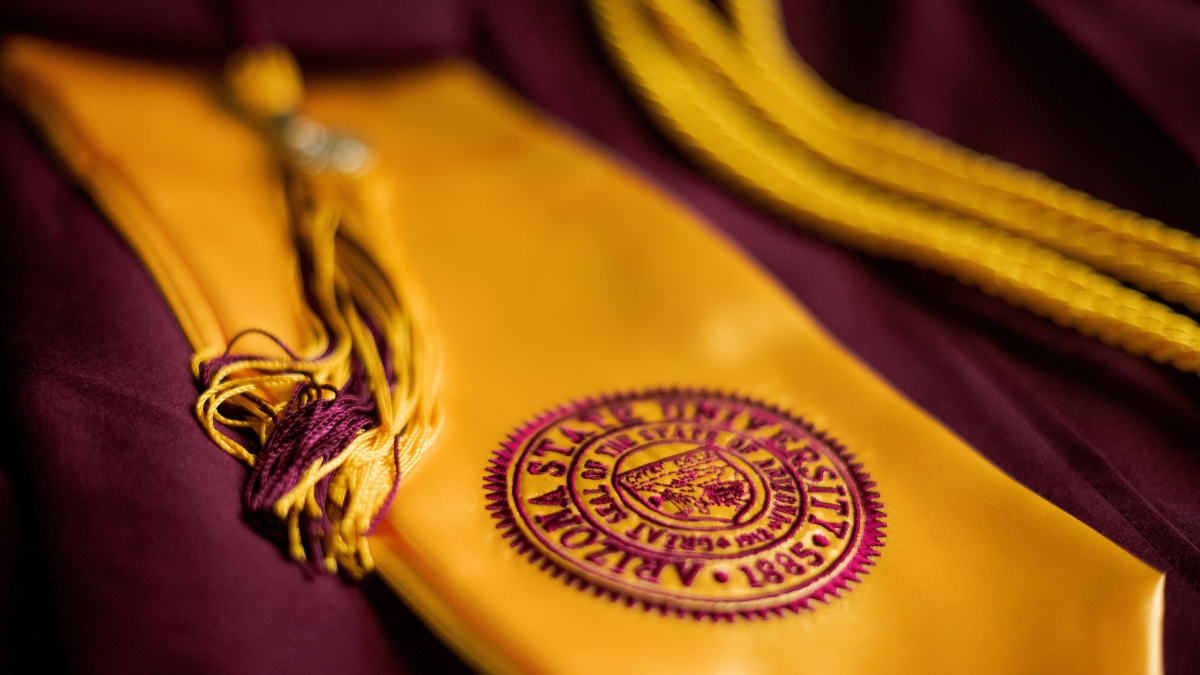
Photo of graduation regalia by ASU
Editor’s note: This story is featured in the 2024 year in review.
Karyn Cooks said that by earning a degree through ASU Online, “I was able to put a bow around a lifetime of experience.”
Cooks, 60, who earned a master’s degree in nonprofit leadership and management in 2020, is one of thousands of mid-career adults who realized that enrolling in ASU Online could get them closer to their goals.
Some, like Cooks, are looking to make a career leap, while others, like Margie Albert, who earned her bachelor’s degree in liberal studies last year at age 73, are seeking personal fulfillment.
With more than 300 degree and certificate programs, ASU Online has something for everyone. The asynchronous courses allow adults who are balancing families and careers to do classwork when it’s convenient. And online students take the same courses and learn from the same faculty as Sun Devils who attend class on campus.
“I needed to get my head back into the academic game, and ASU gave me every reason to continue,” Cooks said.
“Once I was immersed in it, I wondered what took me so long.”
The over-50 student population is not huge. Only 5% of all ASU Online graduates in the past year were 50 years old or older, according to Casey Evans, chief operating officer for EdPlus, the unit that houses ASU Online. But that amounts to about 5,000 learners.
For many, it’s not their first time in college. For those age 50 or older, the average number of transfer credits they bring is 74, which is about 15 credits more than their counterparts who are under age 50.
Older students pick similar majors as younger students. The top three most popular ASU Online degrees for over-50 undergraduates are liberal studies, organizational leadership and nursing, while for under-50 undergrads it’s psychology, nursing and liberal studies.
Evans said that liberal studies and organizational leadership are popular degree programs because they’re so flexible that most previously earned credits can transfer. Nursing ranks high because many registered nurses enroll in ASU Online to earn their BSN for promotion.
For over-50 graduate students, the most popular degree programs are social work, legal studies and special education (applied behavior analysis), while for under-50 graduate students, it’s special education, forensics psychology and social work.
While career is often a consideration, Evans said she has seen older learners enroll to earn the degree they always wanted.
“A parent told them they should get a degree a business but now they’re getting this degree in humanities, which is what they wanted to pursue in the first place,” she said.
While earning a degree is never easy, older learners can have an advantage.
“When you have experience working in a job, you’re used to accommodating the expectations of others. Logging into class is accommodating the expectations of faculty,” she said.
“They’re used to deadlines and due dates and working in teams and listening to other peoples’ input. That’s something that comes with age.
“And there’s a ‘stick-to-it-iveness,’ a personal dedication, that drives them.”
Here are some learners who enrolled in ASU Online later in life:
Timothy Voehl, 55
Degrees: Bachelor’s in healthy lifestyle coaching in 2021 and master’s in global health in 2023.
His story: Voehl had earned a college degree in 1991, but his world turned upside down when, at age 36, he was diagnosed with a neuromuscular disability.
“There was no treatment or cure available for me so I was given a morbid, shortened life prognosis. My life quickly went downhill, and I lost almost everything dear to me,” said Voehl, who lives in Gilbert, Arizona.
In 2014, when he was 45, he got divorced.
“I decided, ‘OK, I can continue to let my life slip away, or I can fight back.’ ”
The thought of going back to college with a disability was daunting.
“Fortunately, since my heart longed for a new start, my prior college experience and my adult wisdom guided my path forward.”
He earned an associate degree in electroneurodiagnostic technology from GateWay Community College in Phoenix, then transferred to ASU, where he started taking classes on campus.
“Early on, I struggled getting to class. When you have a disability, everything is stressful,” he said.
“ASU disability services was great at supporting people like me, and I got extra time so I didn’t feel rushed."
Eventually, he switched to online, and after he graduated and decided to pursue a master’s degree, he decided to go through ASU Online again.
Voehl became interested in how lifestyle affects health, and he created the Healthy Lifestyles Organization, an ASU Online student club that was named Outstanding Undergraduate Student Organization last year. He was also named Outstanding Graduate Student Leader by Educational Outreach and Student Services at ASU last year.
Now 55, Voehl works as a lifestyle coach, embracing “positive psychology” and a blend of Western and Eastern health philosophies.
“A personal passion of mine that has helped me get beyond my physical limitations and get more confidence is ballroom dancing, so I’ve started coaching dance athletes,” he said.
Voehl said he would advise other older learners to “zoom out.”
“Rather than zooming in on microdetails of your class or your teacher, zoom out and look at the big picture — ‘What am I getting out of this?’ ‘What is my long-term goal?’ ”
Graduation: Voehl attended both of his graduation ceremonies, though his undergrad commencement was limited by COVID-19 precautions to a quick walk across a stage.
“My graduate ceremony was very different. I got to sit in an auditorium with thousands, invite family from Minnesota and Vermont and be inspired by distinguished speakers," he said.
“I really felt like I had accomplished something great and was embarking on future career greatness. The challenge was deeply accepted.”
Karyn Cooks, 60
Degree: Master’s in nonprofit leadership in 2020.
Her story: “I invented myself, as so many Angelenos end up doing,” she said.
Cooks’ career has included a wide array of positions, including jobs in marketing, media, communications and as a consultant in Los Angeles.
“I have a portfolio career,” she said.
“But how do I translate all of that experience for someone who wouldn’t understand that you can bob, weave and navigate your way through different experiences and every single one of them lends itself to the next one?”
She was intrigued when a friend told her she should get a master’s degree because she would be an excellent director of a nonprofit.
“I couldn’t shake it, so I started to Google what I needed to do,” she said.
She considered universities in Los Angeles, but cost and logistics were issues.
“You can’t drive all over Los Angeles,” she said, pointing out that trying to make an evening class across the city after working till 5 p.m. or later was nearly impossible.
Then she looked into ASU Online.
“I loved that it was asynchronous and it was more affordable than other programs,” she said. “All those important barriers were removed.
“And coming back as an older student with all this life and professional experience, I would venture that I got more out of the experience than almost anybody else.”
She was particularly inspired by positive feedback from a professor after navigating a tricky exchange on a class message board.
“It was in all caps — 'exemplary leadership,' ” Cooks said. “It was such a gift.”
Cooks had ups and downs during her time in grad school, when she worked full time and took classes full time. And her first class did not hit the mark. But she persevered.
“I have a big network, and I was very transparent throughout. I would get three-quarters of the way through a class and say, ‘I’m just at the point where I’m having my meltdown.’ ”
Now she is the development director for a large health nonprofit.
“I would never have a job like that without that degree,” she said. “I carry not just life experience, but I also have an advanced degree that is designed specifically to support the social impact space.”
Graduation: Cooks graduated in December 2020, when the pandemic canceled in-person commencement ceremonies.
“I did a drive-by graduation. I had a cap and gown and a magnum of champagne in front of my condo in Studio City, and everyone drove by and my octogenarian parents sat on the balcony waving.”
Margie Albert, 74
Degree: Bachelor's in liberal studies, completed in spring 2023.
Her story: Albert started college right after high school but did not finish. She had a long career in media, finishing with Gannett in Phoenix, where she was director of digital development and training. Then she started her own consulting business.
In her late 60s at that point, she considered completing her undergraduate degree a personal goal.
“Quite honestly, I was scared. There’s no financial aid for a late-60s woman going back to school and it cut into our retirement, but my husband knew how important it was for me,” she said.
An ASU Online advisor encouraged her, realizing that she had about 50 college credits that would transfer into the liberal studies degree program.
“It wasn’t going to help me with a career at that point, so I needed the fastest path to a bachelor’s,” she said.
Albert loved her classes.
“I had to take a math class, and it scared the crap out of me but I did it. It was the only 'B' I got,” she said.
“I loved the history of Italy. Forensic anthropology was terrific. ‘Sex in the Media’ was fascinating. (My classmates) were appalled — literally appalled — at the way women were portrayed in the 1950s and '60s.
“What I found is that because I had so much life experience, I felt like I was really a contributor.”
It took her six years to complete her degree, and during that time she worked as an adjunct faculty member in the Cronkite School of Journalism and Mass Communication, teaching media sales and solutions.
“It was so worthwhile. I have a college degree, and it has changed the way I perceive myself.”
Graduation: Albert and her husband were planning to move back to their native Minnesota in February 2023, so ASU allowed Albert to walk in the December 2022 commencement ceremony, even though she was three credits short, which she completed the next semester.
“I wanted the entire experience, and at that point I didn’t care that I was 73 years old walking with 22-year-olds,” she said.
Her granddaughter designed her cap, which said, "She believed she could so she did."
Several graduates came up to her and asked her age.
“I was proud to say that I was 73 and I went back to school, and if I can do it, anyone can do it. It’s never too late.”
Robyn Jones, 50
Degree: Bachelor’s in liberal studies, graduating this spring.
Her story: Jones started her journey as a Sun Devil right out of high school on the Tempe campus. Her family, who lived in the Bay Area, came to Arizona for spring training every year.
“So I got to see the campus for many years and loved the area, and it was an hour flight from Oakland to Phoenix,” she said.
She majored in journalism, dreaming of getting paid to travel and write about it. Then she got a job as a bookkeeper.
“I loved the puzzle of it,” she said. “Having to do reconciliation and find that last little bit.”
Jones left ASU before she finished her degree.
“I came home for the summer, and I missed the ocean and the coast,” she said.
“Over the years, I took a class here and there, but you meet someone, get married, have a full-time job, take a class, and here comes kid number one and another class and kid number two.
“Family became the priority.”
Now, she’s the vice president of finance for a startup in the Bay Area and still loves accounting.
“People think we’re ‘accounting nerds,’ but it’s social because you’re talking to the entire company, to payroll, to customers and to the vendors,” she said.
Then, when Jones’ son was 15, she was talking to him about the importance of the early-college program he was about to begin in high school.
“I was telling him that I was so happy he was on this trajectory and that college is so important,” she said. “He said, ‘If it’s so important for me, what about you?’
“Your kids are so much smarter than you want them to be in some moments.”
In 2021, with her kids at ages 11 and 15, Jones realized that nap times and day care were behind her.
“The time is never right, so you just have to take that leap. The excuses were all gone.”
With her previous time at ASU and the subsequent courses she took over the years, she was admitted to ASU Online as a third-year student. But she had to retake two courses.
“Things change. When I took business law in 1992, we were barely breaking into the internet. With computer technology, we had a floppy disk to practice coding,” she said.
Like many students, Jones, who works remotely, has had to perfect time management.
“Dedicating weekends and a few nights a week for homework was a routine I had to get into, where I used to have free time.”
She was pleased with the support she got as she learned the Canvas platform.
“ASU has you set up with all the tutorials and hand-holding videos, like how to use the library,” she said.
“Everything is there if you look for it.”
Graduation: Jones will graduate in May, but is not sure if she’ll attend commencement ceremonies.
“I love to celebrate other people, but sometimes it’s hard to be the center of attention,” she said.
More Sun Devil community

Photos: 2025 Tempe Open Door
Arizona State University's 13th year of Open Door events concluded on the Tempe campus on Feb. 22.Snakes, science and little pig tails were just some of the sights and subjects that delighted…
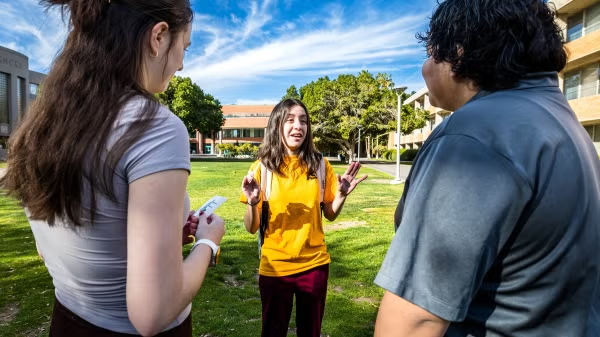
Adventure coaching takes student support outdoors
On a recent sunny morning, a circle of Arizona State University students is flinging colorful balls and toys to each other on a lawn. Each student had to focus on all the items flying through the air…

Photos: 2025 Polytechnic Open Door
Families explored sound, automotive technology and other engineering fun at Saturday's ASU Open Door, where the Polytechnic campus' specialities came into the spotlight.The free annual event welcomes…


